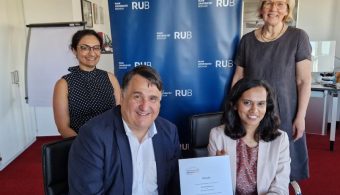Prime Minister Narendra Modi commemorated the 10th anniversary of the “Make in India” initiative, launched in 2014, with a focus on boosting manufacturing, increasing exports, and attracting investments.
Hailing the progress, Modi noted that the program has played a significant role in positioning India as a manufacturing and innovation powerhouse. In a blog post, he wrote, “The impact of Make in India shows that Bharat is unstoppable,” celebrating the collective efforts of 140 crore Indians in driving this success.
Major Achievements Across Key Sectors
Highlighting the initiative’s success, PM Modi shared insights into the remarkable growth in various sectors. He emphasized the rise in mobile phone manufacturing, which has seen a leap from just two manufacturing units in 2014 to over 200 today. Exports in the sector have surged from ₹1,556 crore to an astounding ₹1.2 lakh crore, representing a 7,500% increase. “Today, 99% of mobile phones used in India are made in India. We’ve become the second-largest mobile manufacturer globally,” Modi wrote.
The steel industry has also flourished, with India becoming a net exporter of finished steel, while production has increased by over 50% since 2014. Additionally, the country’s semiconductor manufacturing sector has attracted investments worth over ₹1.5 lakh crore, and India is now the 4th largest producer of renewable energy, with capacity increasing by 400% over the past decade.
Defence, EV, and MSME Growth
India’s defence production has also experienced a massive boost, with exports rising from ₹1,000 crore to ₹21,000 crore across 85 countries. The electric vehicle (EV) industry, once virtually non-existent in 2014, is now valued at $3 billion. Indigenous production of state-of-the-art equipment, including the Vande Bharat trains and BrahMos missiles, also showcases the wide-ranging impact of the Make in India initiative.
In his reflections, PM Modi underscored how the program has empowered India’s youth and the MSME sector, fueling dreams and transforming the economic landscape. He lauded the Production Linked Incentive (PLI) schemes, which have attracted substantial investments and created numerous job opportunities.
Investment and Global Supply Chain Integration
Commerce and Industry Minister Piyush Goyal further emphasized the success of the initiative, noting that the country’s foreign direct investment (FDI) inflows have increased by 119%, reaching $667 billion over the last 10 years. “We have achieved great success, and a brilliant future is ahead for manufacturing in the country,” Goyal remarked, adding that India’s share in the global supply chain has significantly improved.
India’s FDI is expected to grow further, with the Department for Promotion of Industry and Internal Trade (DPIIT) forecasting annual investments to hit $100 billion in the coming years. Streamlined approval processes and reforms in key sectors such as defense, railways, and telecom have contributed to the growing investment climate.
Continuing Momentum and Future Goals
PM Modi concluded by calling on young Indians to join the initiative and continue driving growth. Despite global challenges such as the COVID-19 pandemic, India remains firmly on its growth trajectory.
“The momentum is clearly in India’s favor,” Modi said, stressing the need for excellence and the importance of maintaining a “zero defect” approach to manufacturing. As the initiative enters its second decade, the government remains committed to further reforms and initiatives to promote manufacturing, innovation, and investments across the country.



